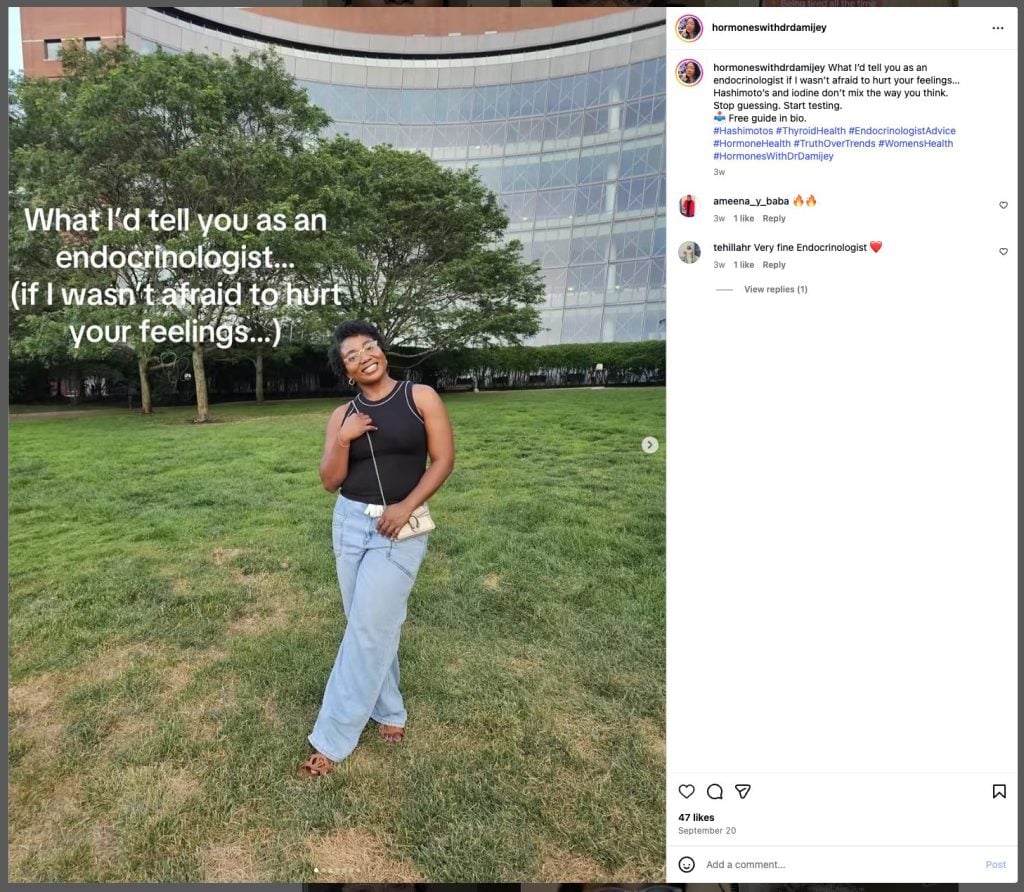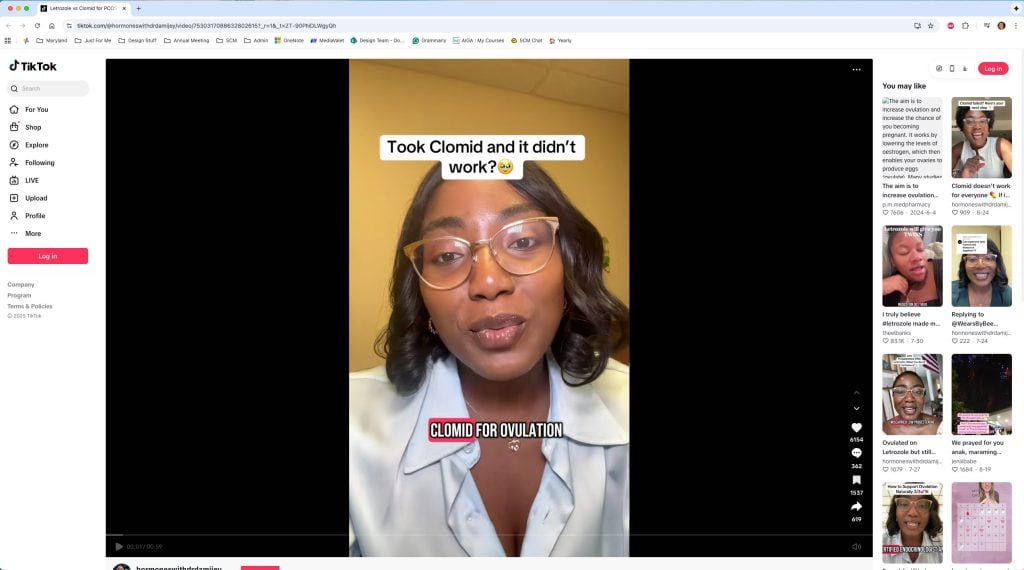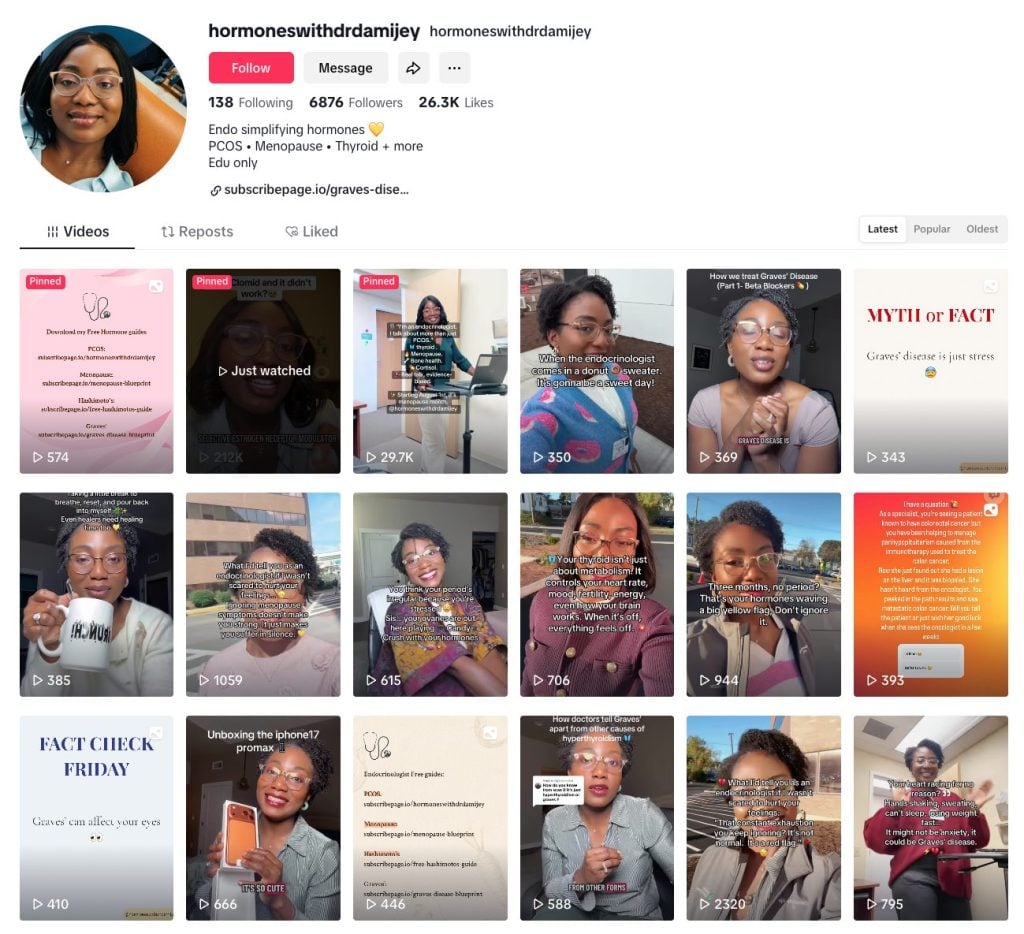Omodamola Aje, MD, has built a social media platform to provide women with the tools they need to ask their doctors informed questions and help guide decisions in their treatment, from menopause to hypothyroidism. Aje is using her platform to not only help build a sense of community, but to cut through the rampant misinformation surrounding metabolic health.
Omodamola Aje, MD, a clinical endocrinologist at Berkshire Medical Center in Pittsfield, Mass., had a patient starting menopause, suffering all the symptoms that it carries — hot flashes, night sweats, poor sleep. After careful evaluation, Aje put the patient on hormone replacement therapy after a full assessment, and not long after, she got a call from the patient’s husband, who thanked Aje for “giving [his] wife back.”
That moment changed everything. “It reminded me that good medicine is not just science, it’s humanity,” Aje says. Inspired, she began sharing bitesize, evidence-based videos on social media. Her posts, covering menopause, fertility, polycystic ovary syndrome (PCOS), diabetes, and hypothyroidism, have now reached women around the world, some garnering hundreds of thousands of views.
This kind of digital health advocacy is crucial here in 2025, when everyone is online, and especially for women, whose access to healthcare is not equal in many parts of the world, whether through geographical location, financial situations, or culture. “It’s my way of bringing knowledge to people where they already are,” Aje says. “Women are already online, so giving them that knowledge there just makes it easier for everybody.”
Half-Baked Knowledge
The COVID-19 pandemic caused the healthcare industry to pivot to the
digital world with the rise of telemedicine and electronic prescribing. The
pandemic, of course, was never a good thing, but some good things did
come out of it. Now, people who might not have had access to healthcare
could have a virtual consultation with a doctor; they could have needed
medications sent in. People could connect with others about their medical
problems and feel a sense of community. “Lots of people who didn’t have a
voice started speaking,” Aje says.

The pandemic may have accelerated telemedicine, but it also unleashed a
flood of misinformation. “Half-baked knowledge is worse than no knowledge
at all,” Aje explains. “If you don’t know, you can learn. But when you think
you know and you’re wrong, you spread confusion.”
Her platform challenges popular myths, such as claims that hormone therapy always causes breast cancer, or that diet alone can “cure” hypothyroidism. “I didn’t set out to become the voice for women,” she says, “but my page has become a space where women feel seen, heard, and not judged.”
Crossing Borders
Aje tells Endocrine News that each month, she comes up with a topic in women’s health that she wants to discuss. She started with PCOS for the first month and created an evidence-based guide that women could sign up for to access. Soon, women from signing up from Korea, Guyana, Kenya. “Sitting in my bedroom, creating this guide, I can actually reach people across borders,” she says. “It’s not like we’re trying to replace the clinic. We’re just trying to break down the walls of these barriers to reach people.”

But Aje’s outreach can also come from something as simple as a short TikTok video. One of her most viral TikTok posts is of her explaining the difference between clomid and letrozole in 60 seconds, with the caption “Took Clomid and it didn’t work?” Aje says that one of her patients even mentioned the video after realizing her OBGYN had put her on letrozole, and that now the patient understood why.
“It’s good to know that what I’m doing is helpful for people and it’s actually feeding back to me,” Aje says. “It is good to know that what you’re doing is helpful. I get the comments all the time: “Thank you, finally somebody explained it the way that my doctor didn’t explain it to me,” but to actually see a real-life patient tell me, that was very gratifying for me.”
Simplifying Things
Aje makes it clear that her platform is for educational purposes only, no diagnoses, no prescribing medications, just a guide on what patients might want to ask their doctors about. A racing heart might be more than anxiety; sudden weight loss might mean something needs to be checked up. A video from a board-certified endocrinologist on Instagram or TikTok carries more weight than a Google search.
And Aje says building this platform has helped her in the clinic as well. She’s learned how to simplify things, how to talk to patients in terms they can better understand. “Then for my patients in the community, in my online community too, they get to see things I’ve lived through, experiences that I’ve seen in my clinic,” she says. “They’re interconnected, my online platform and my clinical practice, but at the same time they’re separate.”
Science of Balance
For Aje, her educational platform is especially relevant for endocrinology, since it’s a science of balance. Hormones affect every system, and if even one thing gets off balance, it can cause chaos. “I can’t imagine myself doing anything else,” she says. “It literally helps you to put things back into perspective, into balance.”

As a fellow, Aje earned an Early Career Award from the Endocrine Society and has been an active member ever since. She’s taken her passion for endocrinology and now wants to convey that not just to her patients, but to others who are interested in endocrinology. “If it’s something that you have a passion about, don’t let the fear of what people are going to say, judgment, or even critics or backlash, stop you.”
Aje stresses the importance of separating out the educational material in social media posts from visits in the clinic. Providing good medical education, especially now when misinformation can spread so quickly (the Endocrine Society had to host a webinar about the falsehoods of “hormone balancing”), is key to helping patients understand what they’re actually dealing with.
“You’ll be surprised, the amount of people that have never even heard half of the things that you want to say,” Aje says. “For upcoming residents, there’s just so much to be done. There’s so much to be uncovered. We want your voice. We want you to speak. Lots of people want to hear what you have to say.”

